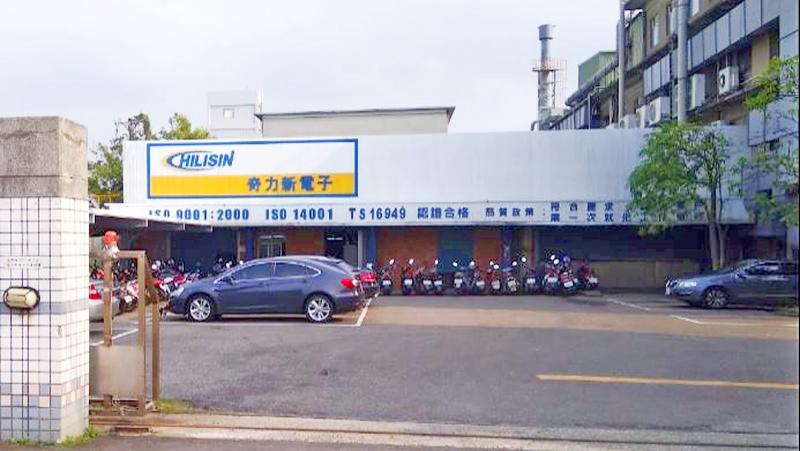Chilisin Electronics Corp (奇力新), the nation’s largest power inductor manufacturer, would continue to benefit from steady demand for inductor components due to the work-from-home economy, while high-margin molding chokes and low-temperature cofired ceramic (LTCC) components are expected to become new revenue drivers, analysts said.
The firm’s cumulative sales rose 9.56 percent year-on-year to NT$15.91 billion (US$558.1 billion) in the first 11 months of last year, as persistent demand for laptops, Chromebooks, smartphones, gaming devices and servers during the COVID-19 pandemic boosted Chilisin’s shipments of mini-molding chokes, high-frequency chip inductors and LTCC components.
The average consumption of LTCC components in 5G smartphones would increase to 10 to 15 units per phone, three times that required for 4G handsets, while the average consumption of inductors would increase from 120 to 180 for each mid-level smartphone and rise from 120 to 180 in high-end models, analysts said.

Photo: Chang Hui-wen, Taipei Times
However, Chilisin’s announcement last month that it would spin off chip resistor maker Ralec Electronic Corp (旺詮) and acquire networking transformer supplier Bothhand Enterprise Inc (帛漢) would result in the company’s revenue dropping about NT$2 billion this year, they said.
“Ralec has posted annual sales of about NT$4 billion, with gross margins of between 25 and 30 percent, while Bothhand has posted sales of NT$2 billion to NT$2.2 billion per year, with gross margin of between 30 and 35 percent,” Yuanta Securities Investment Consulting Co (元大投顧) analysts Calvin Wei (魏建發) and Samantha Chao (趙思涵) said in a research note on Dec. 25.
The deal — with Chilisin acquiring 100 percent shares of Bothhand for NT$2.8 billion — would hurt Chilisin’s revenue outlook in the short term but benefit its operations in the long term, they said.
The transaction is expected to be completed by the end of this month, Chilisin said on Dec. 23.
Yuanta has retained its “buy” rating on Chilisin with a target share price of NT$135, but forecast that the company’s revenue would decline 10 percent year-on-year this year and net income would drop 4 percent from last year.
Chilisin shares ended 2.61 percent lower at NT$112 on Thursday in Taipei trading, after closing out last year with an annual decline of 12.5 percent.

Real estate agent and property developer JSL Construction & Development Co (愛山林) led the average compensation rankings among companies listed on the Taiwan Stock Exchange (TWSE) last year, while contract chipmaker Taiwan Semiconductor Manufacturing Co (TSMC, 台積電) finished 14th. JSL Construction paid its employees total average compensation of NT$4.78 million (US$159,701), down 13.5 percent from a year earlier, but still ahead of the most profitable listed tech giants, including TSMC, TWSE data showed. Last year, the average compensation (which includes salary, overtime, bonuses and allowances) paid by TSMC rose 21.6 percent to reach about NT$3.33 million, lifting its ranking by 10 notches

Popular vape brands such as Geek Bar might get more expensive in the US — if you can find them at all. Shipments of vapes from China to the US ground to a near halt last month from a year ago, official data showed, hit by US President Donald Trump’s tariffs and a crackdown on unauthorized e-cigarettes in the world’s biggest market for smoking alternatives. That includes Geek Bar, a brand of flavored vapes that is not authorized to sell in the US, but which had been widely available due to porous import controls. One retailer, who asked not to be named, because

SEASONAL WEAKNESS: The combined revenue of the top 10 foundries fell 5.4%, but rush orders and China’s subsidies partially offset slowing demand Taiwan Semiconductor Manufacturing Co (TSMC, 台積電) further solidified its dominance in the global wafer foundry business in the first quarter of this year, remaining far ahead of its closest rival, Samsung Electronics Co, TrendForce Corp (集邦科技) said yesterday. TSMC posted US$25.52 billion in sales in the January-to-March period, down 5 percent from the previous quarter, but its market share rose from 67.1 percent the previous quarter to 67.6 percent, TrendForce said in a report. While smartphone-related wafer shipments declined in the first quarter due to seasonal factors, solid demand for artificial intelligence (AI) and high-performance computing (HPC) devices and urgent TV-related orders

MINERAL DIPLOMACY: The Chinese commerce ministry said it approved applications for the export of rare earths in a move that could help ease US-China trade tensions Chinese Vice Premier He Lifeng (何立峰) is today to meet a US delegation for talks in the UK, Beijing announced on Saturday amid a fragile truce in the trade dispute between the two powers. He is to visit the UK from yesterday to Friday at the invitation of the British government, the Chinese Ministry of Foreign Affairs said in a statement. He and US representatives are to cochair the first meeting of the US-China economic and trade consultation mechanism, it said. US President Donald Trump on Friday announced that a new round of trade talks with China would start in London beginning today,